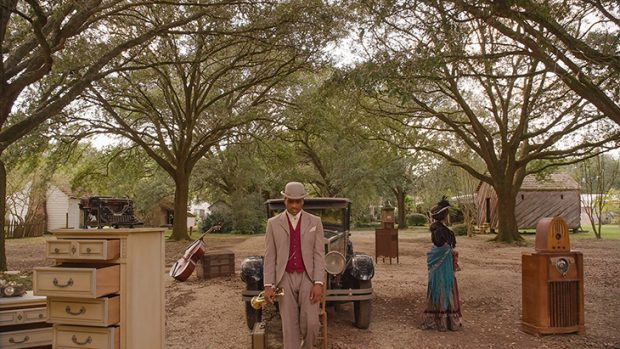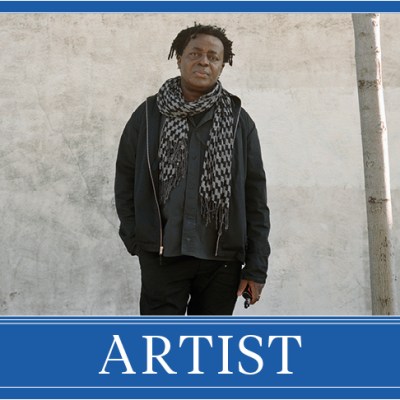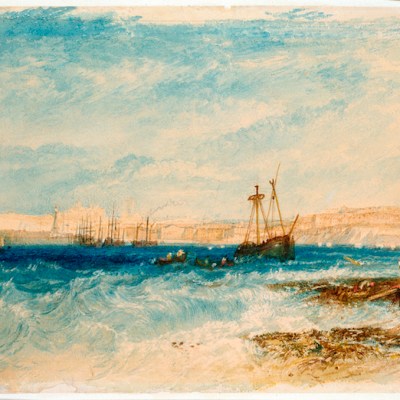At the dawn of the 20th century, Charles ‘Buddy’ Bolden was the crowned king of New Orleans music. The cornettist’s distinctive mix of a looser, freer ragtime with blues, gospel, and swung, syncopated rhythms has since earned him the honorific ‘father of jazz’, in Ted Gioia’s acclaimed history of the genre. But in 1907, at the age of 30, a series of apparently alcohol-related episodes left Holden diagnosed with dementia praecox. He spent his remaining years in Louisiana State Insane Asylum. With no surviving recordings and few photographs, his life passed into myth.
It is as a myth that we find him in John Akomfrah’s dreamlike film Precarity (2017), shown in the UK for the first time in the present exhibition at the BALTIC in Gateshead. He drifts through these frames, from the stoop of a country shack to a stately home to a psychiatric hospital, like a ghost amid a golden, autumnal colour palette reminiscent of sepia tone, and a soundtrack drenched in a reverb like sonic mist, the aural equivalent of a haunted moor in an MR James story.
Precarity (detail; 2017), John Akomfrah. Courtesy Lisson Gallery; © Smoking Dogs Films

Precarity comes cloaked in a dense skein of collaged music and sound, lullabies running over operatic arias, the low-cut jangle of 78 discs, foley sounds and voices that swim from speaker to speaker in a rich, encompassing 7.1 surround mix. But when we come to actually see Buddy’s band strike up in the film’s final minutes, all we hear is the whispered rotation of the ceiling fan. The music is never synched to picture, as if structurally out of tune. Akomfrah disrupts the very grammar of cinema, splitting his image across three big screens so we see the close-up and the wide, the shot and its reverse, the gaze and its object, simultaneously. Time gets telescoped and stretched; a gap is opened up in the inexorable logic of the movement image.
Akomfrah knows all too well that identity is an ‘endless, unfinished conversation’ and that history itself is ‘not wrapped up’, as Stuart Hall says in The Unfinished Conversation, the other major film to accompany Precarity at the BALTIC (Psyche, an eight-minute short from 2012, is also screening). The Jamaican-born sociologist, one of the founding figures of the British New Left and former director of the influential Centre for Contemporary Cultural Studies at Birmingham University, has been a major influence on Akomfrah’s work since the artist’s days as a member of the Black Audio Film Collective in the 1980s and ’90s. Graduating from Portsmouth Polytechnic in 1982, Akomfrah and his colleagues pioneered a new form of documentary, making liberal use of archive footage mixed impressionistically with newly shot tableaux, allusive spoken text, and a highly experimental use of sound in order to ‘decode’ (in Hall’s terms) dominant narratives about black British and diasporic culture.
Precarity (detail; 2017), John Akomfrah. Courtesy Lisson Gallery; © Smoking Dogs Films

Both the main features here are portraits of a city and an era as much as of an individual. Akomfrah learnt from Hall that subjectivity lies at the intersection of a particular time and a particular place, that biography is always social. But while The Unfinished Conversation sticks to a year-by-year chronological narrative, Precarity flits back and forth, repeating images, lines, and sounds in a way that feels distinctly musical, like a theme and variations. One recurring image in the film shows water running over photographs, old clothes, musical scores, a gun, suggesting the implacable flow of time and the washing away of all traces of a life. But this is a past that refuses to stay past, a story whose resonances continue to echo to the present day. Akomfrah’s Precarity is a mesmerising tribute to a life cut short that still casts long shadows.
‘John Akomfrah: Ballasts of Memory’ is at BALTIC Centre for Contemporary Arts, Gateshead until 27 October.



